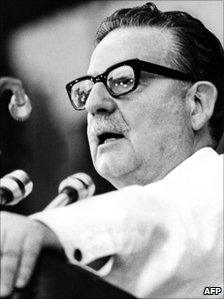Chile tackles questions about Allende and Neruda deaths
- Published

They were towering figures in 20th Century Chile: Salvador Allende and Pablo Neruda, the president and the poet, two men united in life by their left-wing politics, and divided in death by a matter of days.
For years, Chileans have been taught that Mr Allende committed suicide during the military coup of 11 September, 1973, and that Mr Neruda died 12 days later of heart failure brought on by prostate cancer.
But now, both deaths are under investigation.
In both cases, the Chilean military stands accused of murder and the country's former dictator General Augusto Pinochet is once again in the metaphorical dock.
The evidence against the military is far from conclusive.
In the case of Pablo Neruda, it rests largely on the testimony of one man, Manuel Araya, the poet's personal assistant during the last year of his life.
In the case of Salvador Allende, the story is more complicated. There are several conflicting accounts of how the president died.
Last month, on the orders of a judge, his remains were exhumed and handed to forensic experts who are trying to establish what happened.
It is known that Mr Allende died inside the presidential palace during the coup, which brought his Socialist government to an abrupt and bloody end.
'Hail of bullets'
The most widely accepted version is that, as Gen Pinochet's forces closed in on him, Mr Allende shot himself using an AK-47 rifle given to him as a gift by Cuban leader Fidel Castro.
That version is based largely on the testimony of Mr Allende's doctor, Patricio Guijon, who says he saw the president pull the trigger. Mr Guijon, who is still alive, says no-one else was in the room.
The initial autopsy from 1973 supported his testimony, and Mr Allende's family has long accepted that the 65-year-old leader killed himself rather than surrender to the military.
But ever since his death, people have speculated that he was murdered. Many on the political left prefer to think of Mr Allende dying in a hail of enemy bullets rather than taking his own life, alone in the palace.
"His assassination was hushed up," Mr Neruda wrote in his memoirs three days after the coup. "He had to be machine-gunned because he would never have resigned from office."
The latest twist in the story is the emergence of a 300-page military report into Mr Allende's death, compiled in 1973 but never made public.
Last month, Chilean state broadcaster TVN screened a documentary based on the report.
It said it obtained its copy from the rubble of a house destroyed in last February's earthquake in southern Chile. The house was once owned by a military prosecutor.
TVN interviewed Luis Ravanal, a forensic expert who believes there were two weapons involved in Mr Allende's death.
He says the president was shot with two bullets, the first from a small-calibre weapon and the second, when Mr Allende was dead or dying, from the AK-47.
That has prompted speculation that the president was shot by a soldier, a sniper or even one of his aides, possibly as a mercy killing.
Revered figure
While Mr Allende's death has always been shrouded in mystery, the latest claims about Pablo Neruda come as something of a surprise. Most people accept that he died of cancer.
But in a recent interview with the Mexican magazine Proceso, the poet's former personal assistant said Mr Neruda, a lifelong communist and a Chilean ambassador, was given a lethal injection while being treated in a Santiago clinic in the days after the coup.
Manuel Araya says the poet was admitted to hospital on 19 September 1973, and from there he planned to seek exile in Mexico to escape the chaos in Chile.
But Mr Araya says that on 23 September, Neruda made a frantic telephone call to his wife to say he had been given a mysterious injection while he was sleeping.
The poet died later that day, and Mr Araya is convinced he was murdered.
Pablo Neruda's widow is long dead and the Neruda Foundation, which oversees his estate, says Mr Araya's claim is nonsense. Nonetheless, Chilean prosecutors have opened an investigation.
If it is proved that Mr Neruda was murdered, it will be a stunning revelation. Awarded the Nobel Literature Prize in 1971, he is a revered figure, not just in Chile but around the world.
Why now?
Those who insist that Salvador Allende and Pablo Neruda were killed by the military still have plenty of questions to answer.
Why, for example, would Mr Allende's doctor lie about seeing the president commit suicide? And in the case of Mr Neruda, why is his personal assistant only talking now, more than 37 years after the event?
But anyone who dismisses these claims as implausible conspiracy theories should perhaps reflect on Chile's recent history.
In 2009, six people were charged in connection with the death of Eduardo Frei, Mr Allende's predecessor as president.
Mr Frei went into hospital for routine surgery in 1981, at the height of Gen Pinochet's military rule, and never came out alive. His family believe he was poisoned with mustard gas.
In December last year, the remains of Mr Allende's Interior Minister Jose Toha were exhumed as part of an investigation into his death in 1974.
The military said he committed suicide by hanging himself in a hospital wardrobe. His family believe he was murdered.
Nearly four decades after Chile's military coup, the graves of Santiago are starting to give up their secrets.
Over the next few months, judges and forensic experts will sift through the new evidence and reach their own conclusions about what happened to Mr Allende and Mr Neruda in September 1973.
Their findings are likely to shape Chilean history for generations to come.
- Published3 June 2011
- Published23 May 2011
- Published7 December 2009
- Published2 September 2003
- Published14 August 2012